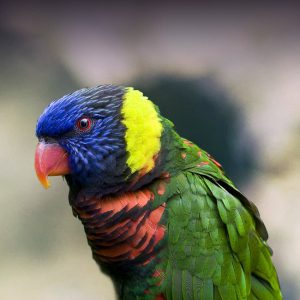
The lory personality is intense, in general. This is not a shy species. The rainbow lory is bubbly and enthusiastic, the "coach" of the bird world, encouraging play whenever its favorite human is around.
Lories, also called lorikeets, are a standout group among parrots. They are among the most colorful parrot species and they have a unique brush-like tongue, which allows them to remove pollen and nectar from flower blossoms. With nectar as a main part of its diet, it's no surprise that lories are high-energy birds.
Native Region / Natural Habitat
Lories and lorikeets are native to Australasia.
Care & Feeding
Lories consume a mostly liquid diet. This means that they have mainly liquid poop, which they love to shoot great distances. Lories are high-energy birds that need a roomy cage as well as plenty of out-of-cage playtime. This bird is for the more advanced bird keeper, and would do well in a one-bird household.
Lories have a very specific fruit and nectar based diet. They will crack some seed, but should not have too much because seed is not natural to their wild diet, which consists mainly of flowers, nectar, pollen and insects. You can feed them mealworms, which are usually available at your local pet shop. Because of this specific diet, mainly commercial lory nectar and fruit, both of which spoil quickly, it is easy for a lory with an inattentive owner to fall ill from malnutrition or worse. Red lories can live for more than 30 years if cared-for properly.
Personality & Behavior
The lory personality is intense, in general. This is not a shy species. The rainbow lory is bubbly and enthusiastic, the "coach" of the bird world, encouraging play whenever its favorite human is around. These birds are constantly busy and lively, allowing little time for rest. Their antics are extremely entertaining for most people, but they can become a little much for someone that's used to a more laid-back companion.
Playtime is crucial for the lory, and the rainbow lory will relish time out of the cage to spend with its guardian. This need should be indulged as often as possible. A rainbow lory that's left alone too often will develop behavior disorders and may begin to self-mutilate. Warn new guardians to be watchful when the bird is out of the cage, however, because this active bird tends to be mischievous and destructive, and will get into trouble quicker than someone can save it from harm. Because this bird is so excitable and intelligent, it is also often nippy, and will generally bite only out of excitement or fear (usually of being put back into the cage!).
Speech & Sound
Lories are quite chatty; in fact there is even a species called the chattering lory. Lories can learn to talk, but they tend to express themselves with a high-pitched shrill that might catch the attention of nearby neighbors.
Health & Common Conditions
Because their diet of nectar and fruit is highly perishable, bacterial infection associated with food spoilage is a concern with lories. A lory's liquid food must be changed and replenished often, especially in warm weather, when the rich food rapidly becomes infected with bacteria. Fruit will spoil too if it's left for even a few hours in the cage. This can cause infections of the crop and even general toxicity. A rainbow lory can live 20 to 30 years, but it is the lucky and unusual lory that makes it that long. There is a common myth that lories don't need water. This is untrue and should be dispelled immediately.
Lories are susceptible to hemochromatosis, or iron storage disease, a metabolic disorder that causes a large amount of iron to accumulate in the lory's body tissue, which can be fatal. Hemochromatosis in lories might be due to heredity disease and/or diet related. Check with your avian veterinarian for guidance when it comes to the best diet for your lory.
:max_bytes(150000):strip_icc():format(webp)/what-horses-eat-that-keep-them-healthy-1886504-FINAL-5ba8dd3746e0fb0025eb2cb4.png)
:max_bytes(150000):strip_icc():format(webp)/horse-eye-resized-56a4dbf03df78cf77284fe95.jpg)
:max_bytes(150000):strip_icc():format(webp)/Horse-grooming-GettyImages-495726400-5876f27d5f9b584db351222e.jpg)
:max_bytes(150000):strip_icc():format(webp)/close-up-of-hand-holding-parrot-705172843-5b52bc4ec9e77c0037b6e5a4.jpg)
:max_bytes(150000):strip_icc():format(webp)/GettyImages-579524112-5c77331146e0fb000140a3a6.jpg)
:max_bytes(150000):strip_icc():format(webp)/budgerigarsonrope-331834_1920-5b628213c9e77c00255b32bc.jpg)
:max_bytes(150000):strip_icc():format(webp)/GettyImages-106887241-58325bc03df78c6f6a9a2ed2.jpg)
:max_bytes(150000):strip_icc():format(webp)/GettyImages-878015800-06106157c9d34a2081db4abcae8699b1.jpg)
:max_bytes(150000):strip_icc():format(webp)/hungry-cat-57b72fac5f9b58cdfda11a62.jpg)


:max_bytes(150000):strip_icc():format(webp)/4374985466_59c7f6545b_o-8b4f24f2f3e544349fe537fde58cfad0.jpg)
:max_bytes(150000):strip_icc():format(webp)/GettyImages-9298737261-500c5a2fba4248f89d1c17a33bf438f7.jpg)
:max_bytes(150000):strip_icc():format(webp)/veterinarian-and-owners-examining-dog-in-vet-s-surgery-164853745-dbecbdb691d549d79487d84356920cf4.jpg)